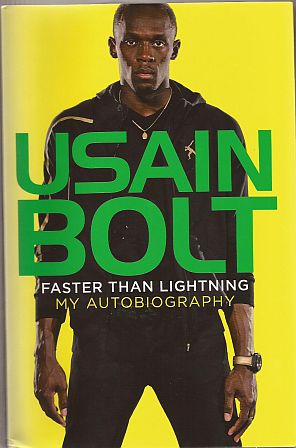"Lord, I don't ask that I should win, but please, please don't let me finish behind Akabusi."
Usain Bolt
Return to the book list for titles beginning with 'U'.
Faster than Lightning, London, Harper Collins, 2013. ISBN: 978-0-00-737141-9
The book opens with an account of the car accident that almost killed him and the sense that he had been kept alive by divine intervention. The passage is worth quoting in full:
“It was the realisation that my life had been saved by somebody else, and I didn’t mean the designer of my airbag, or the car’s seat belts. Instead, a higher power had kept me alive. God Almighty.
I took the accident to be a message from above, a sign that I’d been chosen to become The Fastest Man on Earth. My theory was that God needed me to be fit and well so I could follow the path He’d set me all those years ago when I first ran through the forest in Jamaica as a kid. I’d always believed that everything happened for a reason, because my mom had a faith in God. That faith had become more important to me as I’d got older, so in my mind the crash was a message, a warning. A sign that flashed in big, neon lights.
“‘Yo, Bolt!’ it said. I’ve given you a cool talent, what with this world-record breaking thing and all, and I’m going to look after you. But you need to take it seriously now. Drive careful. Check yourself.’ You know what? He had a good point. The Man Above had given me a gift and it was now down to me to make the most of It. My eyes had been opened, I had God in my corner, and He had put me on this earth to run – and faster than any athlete, ever”.
The account of his life refers to his mom reading the Bible to him and his reluctant visits to church. He comments: “That routine stuck with me, and I turned to religion more and more as I got older, mainly because I came to realise that I’d been given a serious gift. The one thing I began to see was that God always helped people who helped themselves. So whenever I was on a start line and I knew I’d done the work my coach had set me in training, I grabbed the crucifix around my neck, looked up to the sky and asked Him for enough strength to do my best”.
The book gives a gripping account of discovering his talent and from an early age, dealing with expectations of Jamaica.
Losing to Tyson Gay in the World Championships in 2007 was a turning point. He left Osaka determined that he was not going to let it happen again. He would learn from the experience and work harder than ever – “even in the damn gym”.
He gives an insight into the life of the elite athlete: “Like most athletes I was in pain nearly all of the time, and every day I felt pain, after pain, after pain. Gym was pain, sprinting was pain, core work was pain. All of it was pain”.
When as a 200 metres runner he decided to was ready for a second event, the book gives us the low-down on why he chose the 100. It was not about money – it was to avoid having to run the 400! And to avoid the 400 training.
His success in Beijing is attributed to eating 1,000 chicken nuggets – 100 a day for 10 days.
The unexpected life-changing aspects of his win was the way he became public property. Even the Olympic Village he was mobbed by people wanting photos. Going out with friends in Jamaica became impossible.
The book takes the reader into the life of the world’s greatest ever sprinter, the man who “raced hard and played funny”. Highly recommended.

